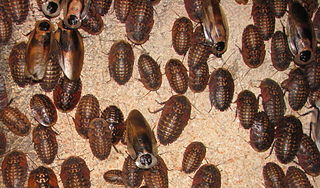
Giant cockroaches, or blaberids, are the second-largest cockroach family by number of species. Mostly distributed in warmer climates worldwide, this family is based on the American genus Blaberus, but much of the diversity is also found in Africa and Asia.

Ectobiidae is a family of the order Blattodea (cockroaches). This family contains many of the smaller common household pest cockroaches, among others. They are sometimes called wood cockroaches. A few notable species include:
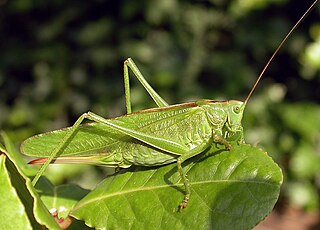
The Tettigoniinae are a subfamily of bush crickets or katydids, which contains hundreds of species in about twelve tribes.
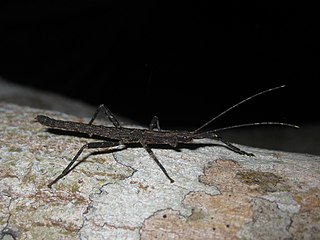
Malacomorpha is a genus of striped walkingsticks in the family Pseudophasmatidae. There are about 15 described species in the genus Malacomorpha.
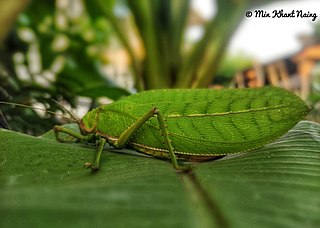
The subfamily Pseudophyllinae contains numerous species in the family Tettigoniidae, the katydids or bush crickets. Sometimes called "true katydids", together with the crickets of suborder Ensifera, they form part of the insect order Orthoptera which also contains grasshoppers.

The Phaneropterinae, the sickle-bearing bush crickets or leaf katydids, are a subfamily of insects within the family Tettigoniidae. Nearly 2,060 species in 85 genera throughout the world are known. They are also known as false katydids or round-headed katydids.
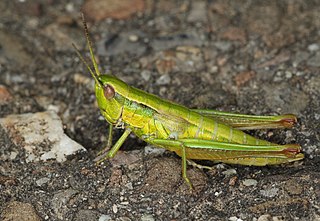
Gomphocerinae, sometimes called "slant-faced grasshoppers", are a subfamily of grasshoppers found on every continent but Antarctica and Australia.

Diapheromerinae is a subfamily of the stick insect family Diapheromeridae. They belong to the superfamily Anareolatae of suborder Verophasmatodea.
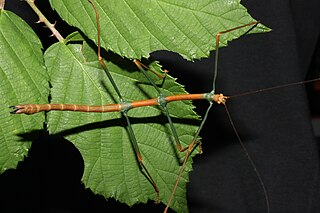
Lonchodes is a genus of stick insects in the family Phasmatidae and the type genus of the family Lonchodidae and tribe Lonchodini. Species have a known distribution that includes tropical Asia and the Pacific.
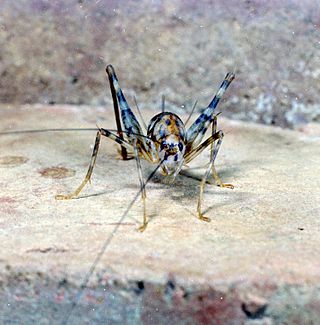
Ceuthophilus is a genus of insects in the cave cricket family Rhaphidophoridae. It contains most of the species that are known commonly as camel crickets.
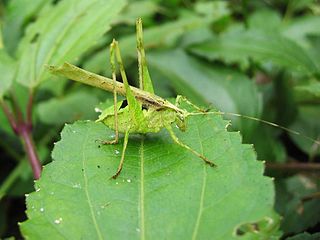
Insara, commonly known as western bush katydids, is a genus of katydids in the family Tettigoniidae.

Diapheromera is a genus of stick insects in the family Diapheromeridae. There are about 14 described species in Diapheromera.
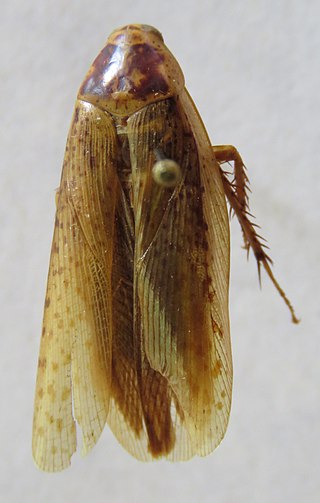
Epilampra is a genus of cockroach in the family Blaberidae. There are more than 70 described species in the genus Epilampra.

Chorisoneura is a genus of cockroach in the family Ectobiidae. There are at least 90 described species in Chorisoneura.

Ischnoptera is a genus of cockroach in the family Ectobiidae.

Haplopus is a genus of walkingsticks in the family Phasmatidae. There are about seven described species in Haplopus.

The Clitumninae are a sub-family of stick insects in the family Phasmatidae found in Asia. The type genus Clitumnus is now considered a synonym of Ramulus.

Deropeltis is a genus of African cockroaches in the family Blattidae, also known as hunchback roaches, erected by Hermann Burmeister in 1838.

The Cladomorphinae are a subfamily of stick insects in the family Phasmatidae. This taxon is particularly well represented in the Neotropical region, but records also exist for Madagascar, Java and the Maluku Islands.


















